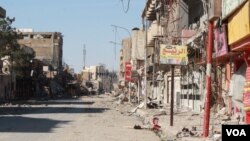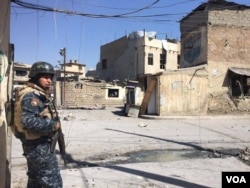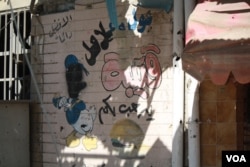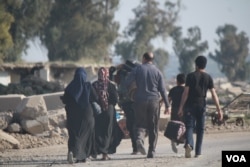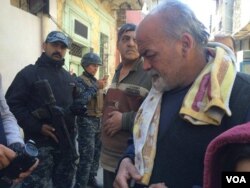"We used to go to movies in Dawasa,” says Issa, 33, a gas station attendant on the road to Mosul. “We liked Van Damme, Jackie Chan. There were Indian movies.”
Now a pitted urban wasteland, Dawasa was once a center of nightlife in Mosul, with popular restaurants, coffee shops, billiards halls and cinemas.
But residents say those days were gone long even before Islamic State militants took over in 2014, with constant car bombings in the years prior. Now, Dawasa's main thoroughfare is deserted, and almost every building is either bombed to the ground or burned out.
A week after Iraqi forces re-captured the area from IS, locals say the expectation that “sleeper cells” will remain in Mosul long after Iraqi forces have won the war, will ensure the neighborhood is unlikely to return to its former glory.
“In the old days you go out at night and stay until 2 a.m.,” says Abu Mohammad, a former water ministry worker and father of three outside his Mosul home in Denadan, a few minutes walk from Dawasa.
Extremists' rise
The rise of extremist groups that began after the U.S. 2003 invasion of Iraq hit areas like Dawasa the hardest, Mosul residents say. Known for fun and drawing large crowds, militants began attacking Dawasa around 2004.
“Dawasa was targeted every month by car bombs or suicide bombers,” explains 21-year-old Muhsen Abdulruzaq around the corner from Mohammad's place. While no longer a social hub in Mosul, businesses still operated there during this time.
Al-Qaida was among the groups attacking civilians and security forces between 2004 and 2014, but other terrorists identified as IS or other names.
During IS rule, restaurants were still open in Dawasa, but very few people went out, adds Omar Mayet, who owned a small supermarket before militants took over. Vast swaths of the population were unemployed and draconian militant laws made people fear public activities, he explains.
Clothing infractions and smoking were among the most common reasons for militants to whip people.
“Who would go to a restaurant?” he asks, laughing. “You had to wear your trousers short and cover your wife up in a veil. There wasn't even any music.”
Sleeper cells
In a post-IS Mosul, residents expect a constant terrorist threat from “sleeper cells.”
In February, a newly re-opened restaurant that drew crowds including generals and foreign journalists was hit by a suicide bomber, killing or maiming dozens of people.
“I wish they would just all go out from here,” says Yunis Khidhayr, a 42-year-old factory worker and father of three in Mosul. “But of course they won't just be finished by this war.”
His eastern-Mosul neighborhood has been under Iraqi control for months, but only a few weeks ago bombs containing some kind of chemicals dropped on a neighbor's house, sending a woman and five children to the emergency room and sickening area families.
Officials say they are already arresting members of “sleeper cells” in eastern Mosul, which has been under Iraqi control since mid-January. But the lack of international support that characterized the fight against IS prior to the Mosul offensive began in October may once again become status quo, says Colonel Nadhm Zaid, of Iraqi National Security Services.
“If we do not deal with this problem it will continue,” he says outside a Mosul base. “In the end, it will harm the international community even more than it harms us.”
Immediate concerns
Closer to the battle zone, families say they are more concerned with the immediate crises than dwelling on the memory of a long-ago peace.
In areas like Danadan, where mortars still fall, but with less frequency as Iraqi forces move forward, the next hurtle is re-supplying their homes after weeks or months trapped indoors as the battle raged outside.
Civilian cars are banned on the roads and the nearest stores are nearly a kilometer away, says Abu Mohammad. Even if there were shops, he adds, many people are out of money.
“The Iraqi forces that first came here gave children money and food,” he says. “The forces that are still here don't have those kind of resources.”
On the other side of Dawasa, where Federal Police occupy a narrow cross-street as IS sniper fire zips down the main road, families are even more desperate.
After spending a month in a basement with his three children and blinded by shrapnel from mortar fire, Mohammad Abdullah emerges from his home, weeping.
“Please, take us out of here,” he calls out. “Help us be finished with this catastrophe.”




